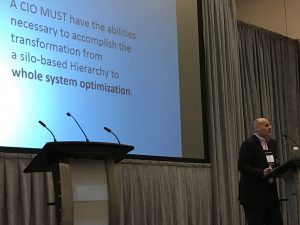
Last week, Intelligent Management was delighted to be in Vancouver as our founder, Dr. Domenico Lepore, was invited to address the national conference of CIOs in Canada to talk about leadership.
We are very proud that Domenico’s participation in the CIO conference was recognized with a donation from the CIO Association of Canada of $1,500 to United Way in support of the African Homework Club run out of Burnaby Family Life.
CIOs are special because they have a uniquely end-to-end view an organization, but they are not immune from the challenges of leadership that every leader needs to understand in today’s world of complexity. Leadership, from a systems view, must start rom understanding that, although the majority of organizations are divided up into functions and silos (and suffer every day from the ill-effects of that) they are in fact one system. Often, they simply do not see it because of an out of date approach to management based on vertical hierarchy and local optima.
What do we mean when we say that any organization is a system? We can be inspired by W. Edwards Deming and say that an organization is a network of interdependent components that share a common goal. In the language of Network Theory we can say that any organization can be portrayed as a “directed network”, i.e. a network with a goal. (In our last post Why Doesn’t Increased Effort Equal Increased Productivity? we looked at how the lack of clear unity in people’s efforts towards the goal leads to, at best, disappointing results.)
How can we manage such a system?
The New Knowledge for Managers and Leaders to Create Quality, Involvement and Flow
Once again, Deming comes to our aid with his recommendations for what he referred to as Profound Knowledge. Here we list the four fundamental areas of management knowledge according to Deming and we have added the context of network theory.
In order to manage such a network we must:
- Understand the dynamics and the emergent properties that are generated when the components of the organizational system interact;
- Understand the variation of the links connecting the nodes of the network, i.e. the processes with which the components perform their role in the organization;
- Understand the psychology of the individual; i.e. the subliminal forces that shape the large majority of people’s behaviour (and massively impact process variation) as well as the collective psychology of the organization;
- Adopt an epistemological framework in respect with our managerial actions; in other words, operate/act according to a theory so as to have a reasonable conceptual handle on the outcome of our actions because the ability to predict how, within a range of variation, our actions will produce the desired result is based on theory. (Theory, by the way, is not the opposite of practice. Good theory is the foundation for effective practice.)
No Expertise Necessary
Dr. Deming stressed repeatedly that leaders must not necessarily have depth of understanding of these individual bodies of knowledge – Systems Theory, Theory of Variation, Psychology and Theory of Knowledge; rather they should have a good grasp of how the interdependence of these elements affect the life of the organization.
These four strands, along with the 14 points that Deming illustrated in his book ‘Out of the Crisis’, represent a guideline for a cultural transformation towards systemic change and systemic management.
Sign up to our blog here and shift your thinking towards broader, systemic possibilities for yourself and your organization. Intelligent Management provides education and training on systemic management, W. Edwards Deming’s management philosophy and the Theory of Constraints (Decalogue methodology) in North America and Europe.
About the Blog Author and Editor
Angela Montgomery Ph.D. is Partner and Co-founder of Intelligent Management and author of the business novel+ website The Human Constraint that has sold in over 20 countries. She is co-author with Dr. Domenico Lepore, founder, and Dr. Giovanni Siepe of ‘Quality, Involvement, Flow: The Systemic Organization’ from CRC Press, New York.





Leave a Reply